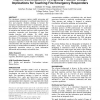Free Online Productivity Tools
i2Speak
i2Symbol
i2OCR
iTex2Img
iWeb2Print
iWeb2Shot
i2Type
iPdf2Split
iPdf2Merge
i2Bopomofo
i2Arabic
i2Style
i2Image
i2PDF
iLatex2Rtf
Sci2ools
124
Voted
CHI
2007
ACM
2007
ACM
Implicit coordination in firefighting practice: design implications for teaching fire emergency responders
Fire emergency response requires rapidly processing and communicating information to coordinate teams that protect lives and property. Students studying to become fire emergency responders must learn to communicate, process, and integrate information during dangerous, stressful, and time-sensitive work. We are performing an ethnographic investigation that includes interviews with experienced fire emergency responders and observations of team burn training exercises with students. We distill salient components of firefighting practice, which are relevant to the design of fire emergency response education systems. We derive design implications for systems that teach fire emergency responders to deal with issues surrounding the communication and integration of fireground information: the mixing of communication modalities, the distribution of information acquisition sources to create information differential and uncertainty, and audible clues. Author Keywords Firefighting, emergency resp...
CHI 2007 | Emergency Responders | Emergency Response Education | Fire Emergency Response | Human Computer Interaction |
| Added | 30 Nov 2009 |
| Updated | 30 Nov 2009 |
| Type | Conference |
| Year | 2007 |
| Where | CHI |
| Authors | Zachary O. Toups, Andruid Kerne |
Comments (0)

